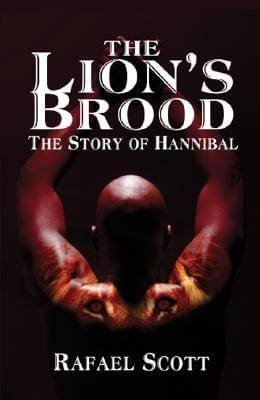Book Review: The Lion’s Brood: The Story of Hannibal
Reviewed by:
ThumperI am weak when it comes to reading books on subjects off the normally beaten path of bestselling African-American novels. My ears perked up when I received a review copy of The Lion’s Brood: the Story of Hannibal by Rafael Scott. I have not read any works of fiction or any non fiction titles about Hannibal. I’m not saying that none have been written, just that I have not read any of them. Lion’s Brood held my interest right away. Regrettably, although the novel had an excellent beginning, I finished it with an empty feeling of a hope unrealized.
The Lion’s Brood opens with the war weary Hannibal facing certain death at the hands of his lifetime enemies, the Roman army. In the hour of his death, Hannibal relive his life from the memories of his childhood home in Carthage, to his military training, to his many victories and defeats against the Romans and governmental politics. The life of a military genius should have all of the makings of a great novel.
I could have loved the hell out of this book. I did not because the novel had so many holes in it. Hannibal’s story seems incomplete. In what should have been an epic novel is treated as if it is a short story or a novella. Huge portions of Hannibal’s life go untouched, or situations happen without explanation. I could not help but get the impression that by doing this Scott was attempting to keep Lion’s Brood as a small book when the novel should have been at 1000 pages long, if not that at least a trilogy of novels.
Characters seem to come and go through the story on a whim. For instance, I'll use the character Imilce as an example. Imilce appears and disappears as if she’s Endora from the TV series Bewitched. When Imilce first appears in the story, she is a young girl who worked for Hannibal’s tutor, Synhus. Hannibal sees her for the first time when he comes to live in his father’s house. Ten years pass, all of a sudden Hannibal looks on Imilce as if he had never seen her before in his life, even though she has never left his father’s house. I found that hard to believe. What is even harder for me to believe is that after Imilce ’reconnects’ with Hannibal, she disappears again, this time for good with no explanation. Imilce is given better treatment by Scott than Hannibal’s mother and sister. After being briefly mention, both vanish from the story, again, with no explanation. I don't get it.
Scott left more unanswered questions in the story. The family dynamics and customs were hazy. Let me give you another example. Hannibal is the oldest of four sons. Hannibal’s father, Hamilcar, is the army general for the nation of Carthage. Hannibal was the only son out of the four that received military training. Why? Why did the other three sons remain at home? Hannibal never returned home to see his mother in Carthage. Why? Scott did not elaborate on any of these points. I was left with a bitter taste in my mouth. I should not have more questions after reading a book than I did before I started reading a book, it goes against logic.
I wish Scott would have elaborated on the country of Carthage, its government, politics and especially its relationship with Rome. I would have found these elements fascinating. I was particularly frustrated by these omissions. I got the impression that Scott took it for granted that I knew all the particulars of the history of Hannibal. This approach is a mistake no author should be guilty of. The author should always assume that the audience do not know anything about the subject and fill in the space accordingly. It is more likely than not that the audience does not have a clue and is depending on the author to bring it up to speed.
What really gets me about the book is that Scott CAN WRITE! The episodes, battles, relationships that Scott included in the novels, he does a remarkable job depicting. The narrative style is that of an easy going, considerate storyteller. Scott’s eye for detail is sharp. The book should have been da BOMB! Scott is one of the few authors who are able to give Steven Barnes a run for the money. I should have had no problem placing Lion’s Brood on the same plane as Barnes’s Lion’s Blood and Zulu Heart, none whatsoever. I wish Scott would have taken the time and had enough faith in the story to allow it to unfold at its own pace. What a shame.


